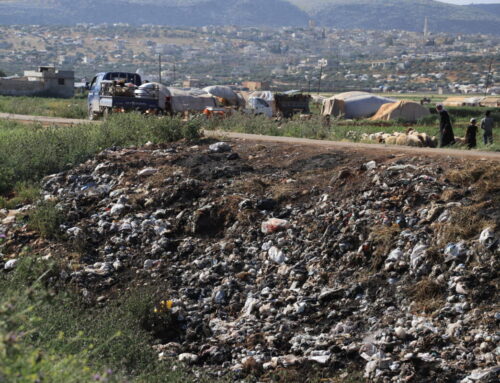Kafr Nabl publisher: ‘Our team is working in hiding’
April 22, 2014 Four French journalists were released from Syria […]
22 April 2014
April 22, 2014
Four French journalists were released from Syria after 10 months in captivity over the weekend. Turkish authorities then discovered the four men bound and blindfolded in southern Turkey, close to the Syrian border. The journalists themselves have not confirmed their captors’ identities, but international news agencies have widely reported that al-Qaeda splinter group Islamic State in Iraq and a-Sham (ISIS) kidnapped the journalists prisoner last June.
If ISIS’ involvement is confirmed, the French journalists’ release would be the latest episode in a growing litany of ISIS’ violations against members of the media inside Syria.
Another such incident came in December 2013, when ISIS raided the offices of two news outlets in the Idlib town of Kafr Nabl—the pro-opposition Kafr Nabl Media Center and al-Gherbal magazine—confiscating equipment and kidnapping staff members at both organizations.
“ISIS accused us of being secularists and apostates and an affront to religion and legitimacy,” says Mohammad Salloum, Editor-in-Chief of al-Gherbal. In the second of a two-part interview, he tells Syria Direct’s Raneem Qubatrus how his team has been forced to close two separate offices as a result of “hostility toward civil society in the midst of gradually increasing religious extremism.”
Q: What are the greatest difficulties you face as an independent magazine in rebel-held areas?
The most important difficulty right now is funding. This is a problem for all independent media outlets. Second are security factors. There’s hostility toward civil society in the midst of gradually increasing religious extremism. At the end of December 2013, the Islamic State in Iraq and a-Sham (ISIS) attacked us and seized all of our equipment. They kidnapped me as editor-in-chief. By divine intervention, the Free Syrian Army freed me after five days in captivity.
The magazine faces many challenges distributing in liberated areas, which are separated from one another by ISIS or regime checkpoints. Not to mention printing problems and securing transport roads for copying and other things.

Q: Can you elaborate on ISIS’ attack on your office in Kafr Nabl?
At the end of 2013, ISIS had a major presence in Kafr Nabl and attacked the Kafr Nabl Media Center and, eventually, our office, accusing us of being secularists and apostates and an affront to religion and legitimacy, saying “take America and the West and see what good they do you.”
They attacked our office and stole all our equipment and took me with them. They started saying that we write against Islam. They took me for five days, and that was when the war between ISIS and the Free Syrian Army began. The FSA attacked the place where I was being held and freed me along with the rest of the prisoners.
Q: How has the magazine come back from that? Are there fears that something similar could happen again?
Fear of kidnappings is constantly present, without a doubt—that’s why we closed our office in Kafr Nabl and were preparing a new office, but we closed that as well. I am in Turkey right now, and the rest of our team is working in hiding. [We have enough funds] to allow us to work for a few months in hopes that we find new support.
Q: Have their been similar instances of persecution by other groups?
We’re always exposed to harassment from some armed rebels. We once wrote an article about rebels taking citizens’ cars [for operations], and some fighters came and threatened us. That was just a verbal threat. Another time, we did an interview with a citizen who spoke to us about corruption in the system of food distribution in some villages, and the following day the interviewee was threatened, and he filmed a video in which he denied what he had said in the first video. Then, the day after that, our photographer who shot the first video was assaulted.
Q: Have you returned to the repression of the regime’s era? And how has this affected the magazine’s distribution?
Not to the same level, although it is comparable. It’s perhaps easier today because ISIS left the area, but extremism is still there. We lost some of the distribution areas that are currently under ISIS control, such as eastern Aleppo province, such as Manbij, al-Bab and Jarabalus.
For more from Syria Direct, like us on Facebook or follow us on Twitter.






